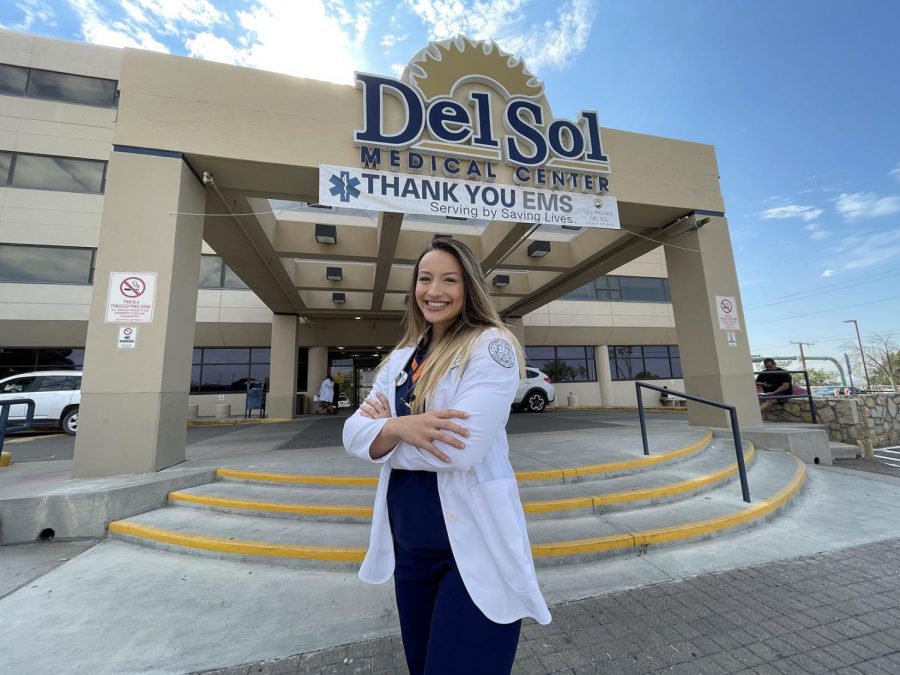The University of Texas at El Paso Nursing Program contributed toward the treatment and mitigation efforts against COVID-19 by distributing vaccines and working with COVID-19 patients in local hospitals.
Dean of UTEP School of Nursing Leslie Robbins, Director of Bachelor of Science Nursing Program Tracey Merworth, DNP, and Associate Dean for Undergraduate Programs Laura Rodriguez, DNP, say that the nursing students helped contribute to the UTEP COVID-19 vaccination clinic, graduate students were working as RNs in local hospitals taking care of COVID-19 patients, and the School of Nursing faculty volunteered to provide vaccinations at several vaccination sites in the border region.
First-year nursing program student Alyssa Crose said it was rewarding to know the nursing program was able to make an impact during a historic time period.
“We are not allowed to work with COVID patients; however, as a UTEP nursing student, we were given the opportunity to help our university give vaccinations and aid in the process of those getting the COVID vaccine, so that the process was much more organized and efficient. We were able to do this by helping sanitize equipment and watching over those who just received their vaccine for the first 15 minutes,” Crose said.
The UTEP vaccination clinic launched in January, as they began vaccinating high-risk individuals working closely with COVID-19 patients, an official from UTEP’s University Communications said.
UTEP nursing students were able to engage in learning by attending clinicals at hospitals, outpatient clinics and private practices, Robbins, Merworth, and Rodriguez said.
Nursing students needed to adapt to changes when they had a limited amount of clinical experiences to get the required amount of clinical hours, Robbins, Merworth, and Rodriguez said.
“The nursing program requires a certain number of actual clinical hours providing care to patients each semester, and as clinical sites adjusted to the ever changing COVID-19 landscape, the availability of clinical experiences was limited. This required our students to be flexible and adapt to many changes over the semester,” Robbins, Merworth, and Rodriguez said.
Nursing student Stephanie Vasquez says she was lucky enough to obtain all her clinical hours during the pandemic.
“As nursing students we had many limitations when it came to patients who had precautions,” Vasquez said. “Almost every patient at each hospital I went to had COVID-19 or were suspected of having it. I don’t know what clinicals were like before COVID-19.”
The early stages of the COVID-19 virus affected the way the nursing students navigated their curriculum.
“The beginning of COVID impacted the program significantly,” Crose said. “We went from attending class in person to Zoom sessions and recorded lectures. We weren’t able to meet with our peers for group assignments, so we would have to video chat and work through our work that way.”
UTEP Nursing leaders said they were not hesitant to send the students to their clinicals during the early stages of COVID-19 because they are trained in taking care of patients with infectious diseases.
“The nursing curriculum includes proper use of Personal Protective Equipment (PPE),” Robbins, Merworth, and Rodriguez said.
The biggest challenge the nursing program faced during the beginning of the pandemic was the limited Personal Protection Equipment, Robbins, Merworth, and Rodriguez said.
Prior to the pandemic, PPE was only needed in certain areas at hospitals and they were able to provide the equipment for nursing students; during the pandemic the nursing program was required to provide that equipment for students, Robbins, Merworth, and Rodriguez said.
Vasquez said students that just started nursing school should appreciate every moment.
“Students who just started nursing school are now able to experience things I never got to experience,” Vasquez said. “Appreciate any simulated hospital days because many of us lost that opportunity. Everything is slowly going back to normal, many of us don’t know what ‘normal; nursing school is. Appreciate and thank your professors, this transition wasn’t easy for them either.”
UTEP Nursing leaders said they are proud of the grit nursing students displayed while moving to online learning, virtual clinical experiences, ongoing changes to hospitals, and outpatient or private practice clinical assignments, Robbins, Merworth, and Rodriguez said.
“I am proud to say that I will soon be a UTEP Nursing graduate,” Vasquez said. “This program has gone out of its way during a pandemic. They provided us with all the materials necessary during each semester. They always made sure we were safe from this killer virus. Thank you for everything UTEP, you’ve been awesome.”
Crose said she is proud of the way the UTEP Nursing Program handled the COVID-19 situation.
“I’m proud of our program for dealing with a catastrophic event in such a way that makes it less difficult for us as students as well as helping us through unfortunate times! Being a nursing student during this pandemic has not been easy, so I am proud of myself and others for staying optimistic and choosing to see the light at the end of the tunnel,” Crose said. “Becoming a nurse is a privilege, which all of us are all working very hard toward regardless of the obstacles that we have faced.”













